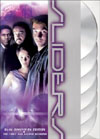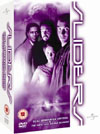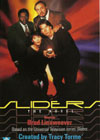DVD Extras include:
But even more damaging, and central to the show's eventual decline, was its inability to create very many long term goals for the main characters that they could be allowed to actually accomplish. Where Doctor Who nourished and eventually thrived on the inexhaustible drives to explore and to make a heroic difference, which allowed it to produce 30+ seasons of sci-fi television over the last 45 years, Sliders never quite rose above Gilligan's Island Syndrome, where, should the characters achieve their aim of returning home, either the show would be over, or they would need new, fresh motivation to continue their slides and keep the show on the air. Without that new motivation, it was obvious that the writers would not allow the four Sliders to ever return home, and they never seemed to get invested in anything else for more than one story at a time.
The main characters and the parallel universe concept are introduced at a leisurely pace in this story, which comes devoid of the usual title sequence and has a much quieter, more cinematic opening. These early scenes cram in a lot of useful information that will pay off later when parallel versions are encountered, but finding much point in it the first time through may be a struggle for the audience at first. Better scripting might have tightened some of the connecting logic and motivation, and provided a second, more immediate set of reasons for the camera to spend that much time on the things it does. But, perhaps in large part due to the chemistry of the cast and the half-satirical-comedy style of the show, the early sections of this story manage to be a tremendous amount of fun. Nice. I loved Jerry O'Connell in his previous sci-fi comedy sitcom "My Secret Identity", and have come to appreciate him in "Stand By Me" as well. But "Sliders" is the show that proved he could be a serious, highly charismatic adult actor as well, and O'Connell does excellent work here in his first story. John Rhys-Davies has always excelled in any role I've ever seen him in, but this is the show that really won me over as a lifetime fan of him and his work. Arturo's character is spot on, all the way through, right from the start. Excellent. This pilot story doesn't really define Wade Wells apart from her work and her ambiguous relationship with Quinn. Sabrina Lloyd makes the character endearing and sympathetic, despite some dodgy, over-enthusiastic dialogue from the script. Good stuff, and as the series went on, she and Quinn would have their characters and their relationship further refined. A lot of great recurring supporting characters are off to a great start as well. Quinn's mother is most prominent, played here by Linda Henning in a manner that makes his brainy beginnings believable. Bennish is also a fun character to see - especially after seeing what a transformation it is for actor Jason Gaffney who appeared with a completely opposite look in the X-Files episode "José Chung's From Outer Space". And of course no Doctor Who fan will fail to recognize Yee Jee Tso playing Wing (another of Quinn's fellow students) from his appearance in "The Untitled Paul McGann Movie" (Doctor Who story no. 160) from 1995/1996. Here he gets just a few fun lines, but we'll be seeing more of him again soon.... Creators Tormé and Weiss seem to have brought with them from Star Trek: The Next Generation one of its composers to create music for their pilot. TV veteran Dennis McCarthy produces one of his typical scores, tasteful yet blandly forgettable, full of washes of orchestral instrument sounds and little punch or drive. Not much attempt seems to have been made to come up with any theme music for the series here either, which is quite bizarre. It is a nice touch to see Quinn summon up the courage to jump through the vortex himself on a test slide BEFORE his double shows up to provide him with all the missing information. Metaphysically speaking, it keeps him in the proactive driver's seat with his invention, which makes for a better narrative. We also get to see the manner in which the timer was designed to operate - having a functionality that actually benefits the Sliders. This is significantly different from the way it behaves during most of the series, where its function is clearly designed to benefit the writers of the show instead, providing extra dramatic pressure during each episode and locking the series into its Gilligan's Island arc. Although we get to see what disrupts the timer's original functionality, this pilot story doesn't actually set-up the functionality that continued throughout the rest of the series.... stay tuned for that tidbit. I do have a bit of a problem with the selectivity of the moving wormhole that initiates the main slide of the story: after sucking in Quinn, Wade, and Arturo, it ignores the blackboard, the wall of the house, and the fence, before sucking in Rembrandt and his car. A bit too contrived for my tastes, and apparently a casualty of the script not being in alignment with the budget. The Ice Age segments are cool, and thankfully only last about as long as interest dictates. Russian America seems a bit over-controlled, but hey, you get to do what you want when you create your own parallel Earth. Cool. Cleavant Derricks makes a late entrance to this story, which helps to emphasize the amount of comedic brilliance his presence adds to the ensemble. Sweet. He can probably add another entire demographic to the audience for that alone. And he can do the requisite singing. But his qualities as an actor and a comedian are what make his character shine, and the pilot story gives him plenty of opportunity to go for the laughs. He is also the most perfect of the regular characters to fulfill the traditional role of the companion in the Doctor Who format: repeatedly asking the questions that the audience needs answers to until explanations have been drawn out of Quinn or Arturo or the guest characters in terms simple enough for any layman to understand. The final climactic act of any story is worth scrutinizing. Sci-fi loves an adventurous hero as a main character, which would certainly work well in Sliders. Quinn is clearly the superior of the two geniuses, the inventor, and the instigator of the journey. He alone bears the responsibility for getting the quartet home, and he is, definitively, the main character of the show. How well is he allowed to be the hero of this first story, as would be ideal? It should first be noted that the story climaxes on an action-packed raid. Nice. This raid, and the subterfuge that makes it work, are all Quinn's idea. Great! Judging by the amount of hope that the raid manages to generate in the resistance fighters, the idea is a great success. But it should also be noted that the supposed point of the raid is to rescue that world's Commander Wade Wells. Quinn looks all set to blossom into a conscientious action hero at the end of this story, knocking out an enemy and pushing to accomplish the rescue. But his own final actions during the raid merely drag parallel Wade unnecessarily into extra danger causing her to get killed, leaving behind a grieving mate, and a grieving resistance unit. Not a great start for our would-be hero. And so it is strange that the raid that you'd think would be regarded as a failure in the resistance unit's eyes would be so welcomed by them as an encouraging success. Thus it shows that this positive spin was the result of a note from the network, instead of something that writers Tracy Tormé and Robert K. Weiss should have been keen to create from page 1. It remains awkward, and less than what one hopes for.
This story has become available on DVD. Click on the Amazon symbol for the location nearest you for pricing and availability:
Comments on this article are welcome. You may contact the author from this page:
|
|||||||||||||||||||||||||||








